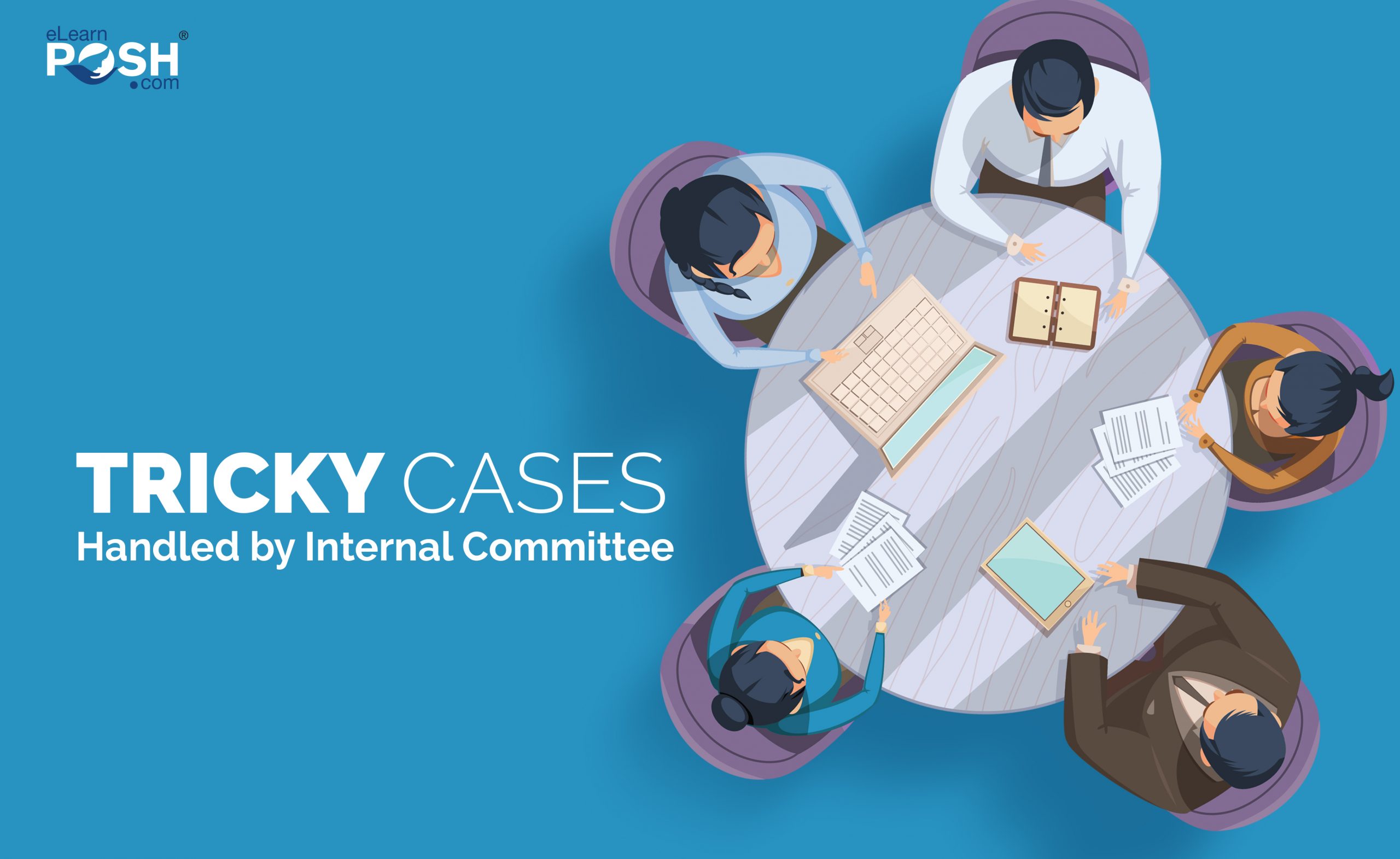
As per the Sexual Harassment of Women at Workplace (Prevention, Prohibition and Redressal) Act, 2013, commonly known as the POSH Act, the employer of every organization with ten or more employees must set up a grievance redressal committee known as the Internal Committee (IC). Internal Committee will receive and redress complaints of sexual harassment at workplace. In addition, IC should also take measures to prevent sexual harassment at workplace.
With powers equivalent to the Civil Court, IC carries a great responsibility. Therefore, it is imperative that the IC is adequately empowered to handle tricky cases. However, every now and then, they can come across some challenging cases. Here are a couple of them:
Tricky Case 1:
Priya and Raj are co-workers. Raj makes lewd comments about Priya’s looks and body when they are alone. Raj continued the behaviour even after she asked him to stop. Despite this, Priya never reported this because there was no evidence or witness to prove her allegation. She felt that her complaint will not be taken seriously, and that Raj will be acquitted.
One day when Priya and Raj were alone in the workplace, Raj made physical advances towards Priya. During this incident, another employee Rajeev walks in and witnesses the incident.
As there is a witness to the incident, Priya files a complaint with the Internal Committee against Raj and submits the details of Rajeev as the witness. She also mentions in the complaint that she has been subjected to harassment over a period of time and the only reason for her not reporting was the lack of evidence and witness.
When the Internal Committee tried to contact Rajeev, they got to know that he has taken a long leave and is not in a position to participate in the inquiry. Summoning Rajeev to testify in the inquiry was also not possible as he did not have access to internet connectivity. This can result in a delay in the completion of the inquiry.
In addition, Raj, the respondent, has applied for a vacant manager position. The decisions taken by the IC after the inquiry will have an impact on his promotion. Hence, they cannot afford to delay the inquiry.
- Should IC go ahead with the inquiry without listening to Rajeev?
- Should IC wait for the only witness to be back to work to complete the inquiry?
- Can Raj be promoted regardless of the decisions of the IC?
Let’s see the answers to these questions:
- Should IC go ahead with the inquiry without listening to Rajeev?
- No, IC should not go ahead with the inquiry without listening to Rajeev as his testimony will be significant in the inquiry. Remember that the IC has powers similar to that of a Civil Court and it can “summon and enforce the attendance of any person and examine him on oath”. Hence IC can ask Rajeev to attend the inquiry in-person or online. The date and time of hearing should be reasonable for Rajeev as well the other respondent and the complainant.
- Should IC wait for the only witness to be back to work to complete the inquiry?
- This is related to the previous question. IC need not wait for Rajeev to get back to work to continue with the inquiry. IC can summon him to attend the inquiry on a date reasonable for him.
- Can Raj be promoted regardless of the decisions of the IC?
- It is ideal to withhold the promotion until the inquiry is completed. However, it cannot be delayed to an undefined date. Hence, IC should try to expediate the inquiry process.
Tricky Case 2:
Here is another tricky scenario.
Nikita’s supervisor Ravi is constantly harassing her. Her co-worker Nandita asks her to file a complaint with the Internal Committee. But Nikita refuses to file a complaint because of the fear of losing her job. Tired of seeing her friend’s plight, Nandita leaves an anonymous complaint at the desk of one of the Internal Committee members. She gives the details of the incident and the name of the harassed and harasser.
As per the POSH Act, the Internal Committee cannot initiate inquiry over an anonymous complaint. Hence, they decide to speak to Nikita about the incident. Nikita agrees that what is mentioned in the complaint is true but refuses to file a complaint.
This puts the Internal Committee in a difficult situation.
IC cannot initiate an inquiry in the absence of a written complaint. But at the same time, knowing well that sexual harassment has taken place, IC not taking any action here will defeat the purpose of its existence.
How should IC handle this incident?
Solution:
IC definitely cannot take suo moto cognizance of the case and initiate an inquiry as the POSH Act does not allow this. However, IC is formed not only to redress sexual harassment complaints, but also to prevent any such occurrences in the organizations. If IC observes that sexual harassment is taking place in the organization, IC can take steps to prevent it. These steps will be different from the redressal procedure.
Hence, the IC can speak to Nikita’s supervisor Ravi about the anonymous complaint they received without revealing any names. IC can inform Ravi that the organization will not tolerate any form of misconduct and repetition will be strictly dealt with. This is a warning, rather than a punishment.
It can also explain the POSH Policy and the penalties of sexual harassment to Ravi. The awareness among the employees that the IC is observing the conduct of the employees is a strong prevention tactic against sexual harassment.
These are some of the many tricky cases Internal Committee of Indian organizations have come across. It is critical for Internal Committee members to be well-equipped to handle such challenging cases.
To make this easy for you, eLearnPOSH.com has a comprehensive course on Prevention of Sexual Harassment for Internal Committee. To know more about our courses and to get answers to your POSH-related queries write to contact@elearnposh.com.
Get answers and FREE consultations for all your POSH related queries. Click here to Join our ‘Not-for-profit’ LinkedIn group.



Leave a Reply